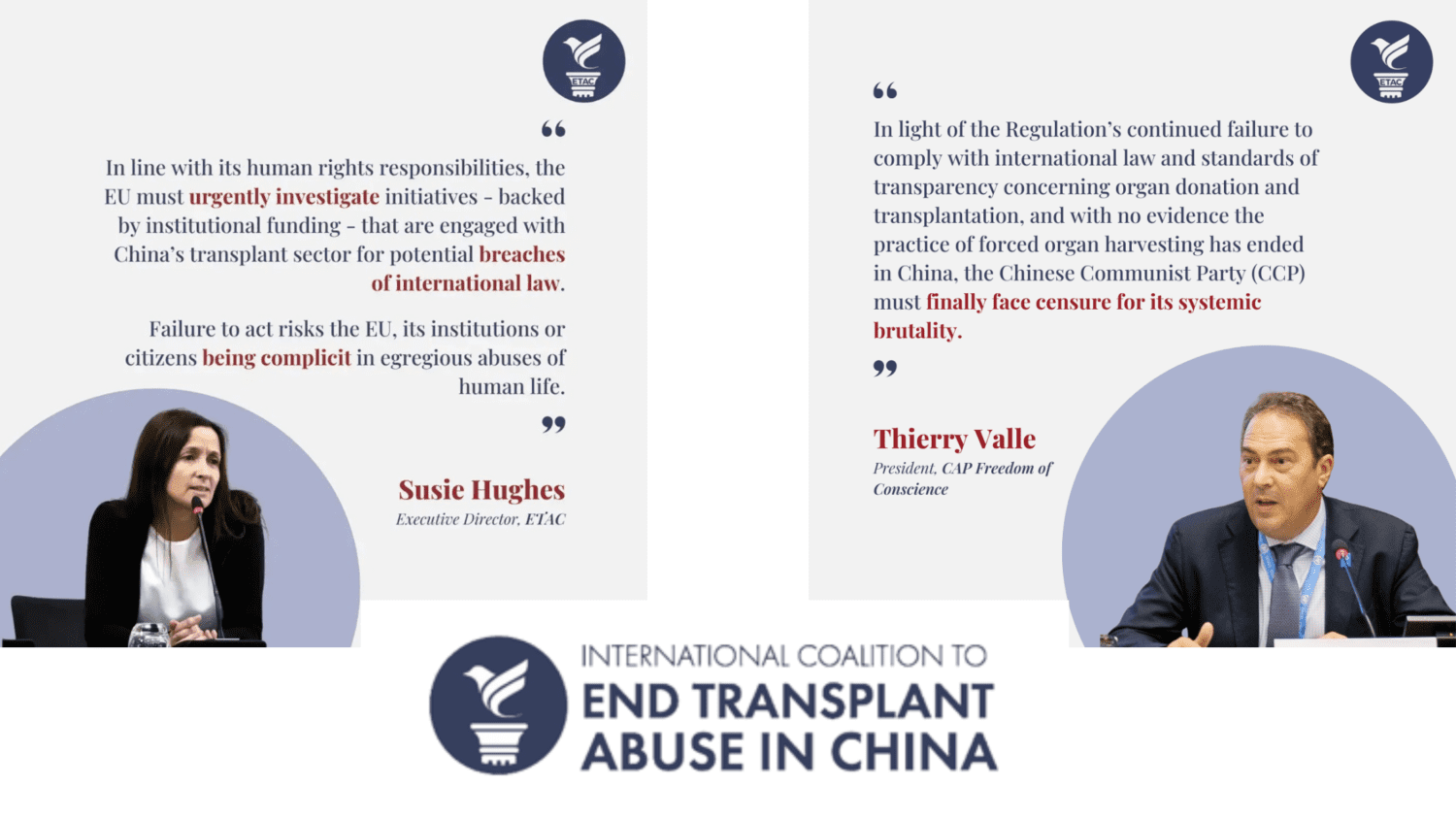In an open letter to the European Union’s (EU) High Representative for Foreign Affairs and Security, human rights organisations have urged Josep Borrell to ‘protect EU citizens and institutions from complicity’ in China’s state-sanctioned practice of forced organ harvesting.
Initiated by the International Coalition to End Transplant Abuse in China (ETAC) and supported by more than a dozen global human rights organisations, the joint correspondence was penned in response to the promulgation of new regulations in China concerning organ donation and transplantation.
There was optimism that the ‘Regulation on Donation and Transplantation of Human Organs’, effective on May 1st, would lead to the alignment of China’s domestic laws and practices with international medical and ethical standards.
However, human rights experts have since condemned the new measures as grossly inadequate. According to campaigners, the ‘Regulation lacks necessary transparency measures’ with respect to the sourcing of organs, and ‘fails to incorporate the World Health Organisation (WHO) Guiding Principles on Human Cell, Tissue and Organ Transplantation into its framework.’
This has led to a system that ‘lacks accountability and denies justice to victims of forced organ harvesting.’
In view of credible reports of forced organ harvesting continuing in China, and no evidentiary indication that forced organ harvesting has ceased, signatories to the letter warn that ongoing EU institutional support for entities engaged in organ transplantation and research in China leaves EU institutions and professionals ‘complicit in aiding and abetting forced organ harvesting.’[1]
Given the prospect of EU citizens travelling to China for transplantations using illegally harvested organs with impunity, the letter also calls for the introduction of ‘mandatory reporting of transplant tourism outside the EU by health professionals and institutions to protect EU citizens and institutions from complicity in the abuse abroad.’
In addition to urging Chinese counterparts to introduce greater transparency and access in line with WHO guidelines, the EU’s foreign policy chief was also pressed to hold China to account for ‘historic injustices of forced organ harvesting against persecuted minorities.’
Researchers estimate that since the early 2000s, there have been between 60,000 and 100,000 transplants taking place every year in China.
Falun Gong practitioners, who are killed when the organs are removed, are believed to be the main source of supply. Since 2017, the Uyghurs, a Turkic ethnic group based in China’s northwestern region of Xinjiang, have also been victims of forced organ harvesting.
Background
For over two decades, China has been accused of prosecuting a state-sponsored campaign of forced organ harvesting using prisoners of conscience, most notably, members of the Falun Gong, a Buddhist spiritual practice.
In 2019, the China Tribunal, chaired by Sir Geoffrey Nice KC, the lead prosecutor of former Serbian war criminal Slobodan Milošević at the International Criminal Tribunal for the former Yugoslavia, conducted an independent legal analysis of all available evidence.
The inquiry concluded that ‘forced organ harvesting has been committed for years throughout China on a significant scale and that Falun Gong practitioners have been one – and probably the main – source of organ supply.’
In January, the European Parliament passed a resolution urging the Chinese Communist Party (CCP) to end its persecution of Falun Gong practitioners. The motion also called for the EU and Member States to impose diplomatic and financial sanctions on entities and individuals found responsible.
Susie Hughes, Executive Director of the International Coalition to End Transplant Abuse in China (ETAC), said:
“In line with its human rights responsibilities, the EU must urgently investigate initiatives – backed by institutional funding – that are engaged with China’s transplant sector for potential breaches of international law.
“At the same time, the EU and its Member States must confront rising cases of transplant abuse involving EU citizens. The EU must introduce mandatory reporting requirements on the provenance of organs obtained overseas to ensure compliance with international law and ethical standards.
“Failure to act risks the EU, its institutions or citizens being complicit in egregious abuses of human life and in the commission of crimes against humanity.”
Thierry Valle, President of the Coordination of Associations and Individuals for Freedom of Conscience (CAP Freedom of Conscience), commented:
“In light of the Regulation’s continued failure to comply with international law and standards of transparency concerning organ donation and transplantation, and with no evidence the practice of forced organ harvesting has ended in China, the Chinese Communist Party (CCP) must finally face censure for its systemic brutality.
“It is high time that the EU uses the tools at its disposal, including the EU Global Human Rights Sanctions Regime, to deter further violations of human rights and seek redress for victims by imposing sanctions on CCP officials guilty of gross abuses.”
Read the full letter : https://europeantimes.news/wp-content/uploads/2024/05/Open-Letter-of-Concern_.pdf
About the International Coalition to End Transplant Abuse in China (ETAC)
The International Coalition to End Transplant Abuse in China (ETAC) is a coalition of lawyers, academics, ethicists, medical professionals, researchers and human rights advocates dedicated to ending forced organ harvesting in China.
ETAC is an independent, non-partisan organisation. We are not aligned with any political party, religious or spiritual group, government or any other national or international institution. Our members are from a range of backgrounds, belief systems, religions and ethnicities. We share a common commitment to supporting human rights and ending the horror of forced organ harvesting.
Contact: info@endtransplantabuse.org
About The China Tribunal
The China Tribunal, a people’s tribunal into forced organ harvesting from prisoners of conscience in China, chaired by Sir Geoffrey Nice KC, conducted an independent legal analysis into the allegations and all available evidence.
Following 12 months of inquiry, the Tribunal unanimously and ‘beyond reasonable doubt’ concluded that forced organ harvesting from prisoners of conscience has been a state-sanctioned, systematic, widespread practice in China that has claimed the lives of a substantial number of victims and that it continues today.
For more information, please visit: www.chinatribunal.com.
[1] We note the Council of Europe Convention against Trafficking in Human Organs and its ratification by at least some EU Member States, as well as their implementing legislation. We note further that several EU Member States have nationality jurisdiction, which means that their local laws against forced organ harvesting apply to their nationals abroad.














 English
English French
French Spanish
Spanish German
German Dutch
Dutch Italian
Italian Danish
Danish Portuguese
Portuguese Greek
Greek Russian
Russian Swedish
Swedish Bulgarian
Bulgarian Hungarian
Hungarian Catalan
Catalan Ukrainian
Ukrainian Polish
Polish Basque
Basque Chinese (Simplified)
Chinese (Simplified) Japanese
Japanese Hebrew
Hebrew Arabic
Arabic Swahili
Swahili Amharic
Amharic Irish
Irish Afrikaans
Afrikaans Albanian
Albanian Armenian
Armenian Azerbaijani
Azerbaijani Belarusian
Belarusian Bengali
Bengali Bosnian
Bosnian Cebuano
Cebuano Chichewa
Chichewa Chinese (Traditional)
Chinese (Traditional) Corsican
Corsican Croatian
Croatian Czech
Czech Esperanto
Esperanto Estonian
Estonian Filipino
Filipino Finnish
Finnish Frisian
Frisian Galician
Galician Georgian
Georgian Gujarati
Gujarati Haitian Creole
Haitian Creole Hausa
Hausa Hawaiian
Hawaiian Hindi
Hindi Hmong
Hmong Icelandic
Icelandic Igbo
Igbo Indonesian
Indonesian Javanese
Javanese Kannada
Kannada Kazakh
Kazakh Khmer
Khmer Korean
Korean Kurdish (Kurmanji)
Kurdish (Kurmanji) Kyrgyz
Kyrgyz Lao
Lao Latin
Latin Latvian
Latvian Lithuanian
Lithuanian Luxembourgish
Luxembourgish Macedonian
Macedonian Malagasy
Malagasy Malay
Malay Malayalam
Malayalam Maltese
Maltese Maori
Maori Marathi
Marathi Mongolian
Mongolian Myanmar (Burmese)
Myanmar (Burmese) Nepali
Nepali Norwegian
Norwegian Pashto
Pashto Persian
Persian Punjabi
Punjabi Romanian
Romanian Samoan
Samoan Scottish Gaelic
Scottish Gaelic Serbian
Serbian Sesotho
Sesotho Shona
Shona Sindhi
Sindhi Sinhala
Sinhala Slovak
Slovak Slovenian
Slovenian Somali
Somali Sundanese
Sundanese Tajik
Tajik Tamil
Tamil Telugu
Telugu Thai
Thai Turkish
Turkish Urdu
Urdu Uzbek
Uzbek Vietnamese
Vietnamese Welsh
Welsh Xhosa
Xhosa Yiddish
Yiddish Yoruba
Yoruba Zulu
Zulu